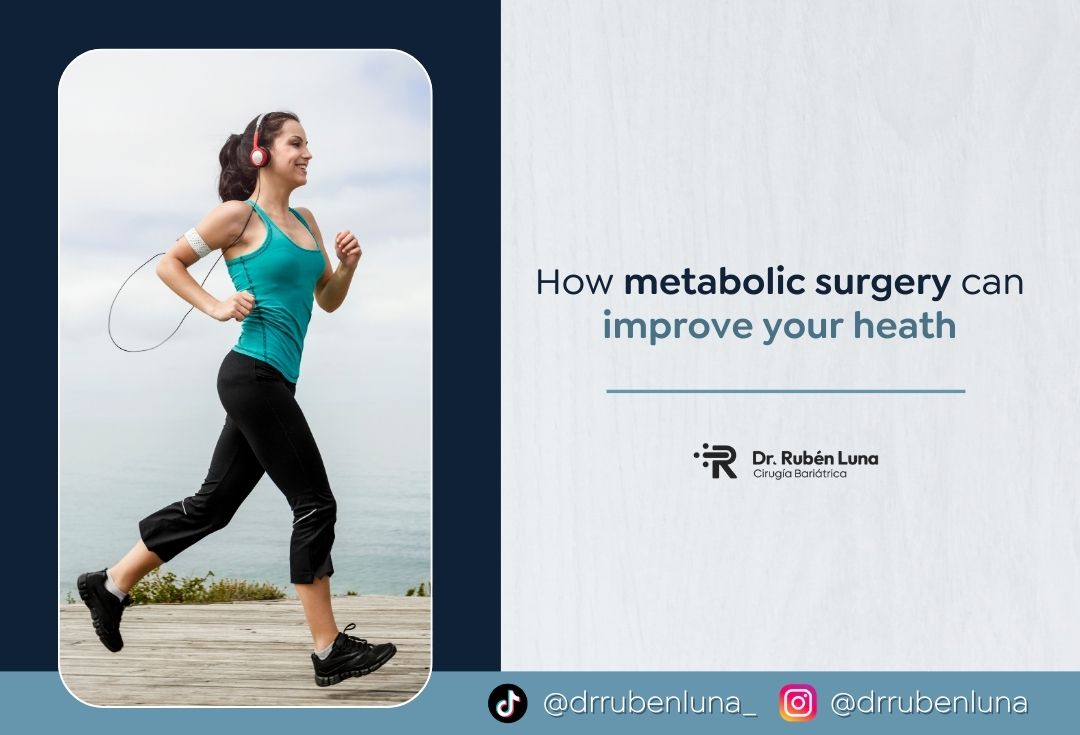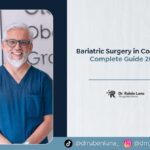The truth about metabolic surgery and why patients travel to Colombia for it
If you’ve been struggling with obesity, type 2 diabetes, or metabolic syndrome, and feel like you’ve tried everything, this blog is for you. As a bariatric and metabolic surgeon, I’ve seen firsthand how metabolic surgery can transform lives—restoring health, confidence, and energy in ways many patients never thought possible. And the best part? You don’t have to navigate this journey alone, or break the bank doing it.
My name is Dr. Rubén Luna, and I specialize in advanced bariatric and metabolic procedures right here in Colombia. Over the years, I’ve had the privilege of helping hundreds of international patients regain control of their health with world-class care, personalized treatment plans, and the latest surgical techniques—all delivered with the warmth and compassion Colombia is known for.
Understanding metabolic surgery
When most people hear the word «surgery» in the context of obesity or diabetes, they immediately think of weight loss. And while that’s certainly part of the picture, metabolic surgery goes much deeper than just helping patients shed pounds. As a surgeon, I view it as a medical intervention that can actually reset the way your body regulates energy, blood sugar, and hormones—offering powerful, long-term improvements for serious metabolic conditions.
Let me explain what sets it apart, and why it could be a life-changing option for you or someone you love.
You might be interested: Reversible Weight Loss Surgery Vs. Permanent Bariatric Surgery
Conditions treated by metabolic surgery
Metabolic surgery has shown incredible success in treating a range of chronic health conditions that are difficult to manage through medication and lifestyle changes alone. These include:
- Type 2 diabetes.
- Metabolic syndrome.
- Insulin resistance.
- Non-alcoholic fatty liver disease (NAFLD).
- Polycystic ovary syndrome (PCOS).
- Hypertension and dyslipidemia.
Many of my patients come to me frustrated—doing everything “right” but still unable to get their blood sugar or cholesterol under control. For them, metabolic surgery becomes more than a treatment. It’s a turning point.
How metabolic surgery impacts type 2 diabetes and metabolic syndrome
One of the most remarkable benefits of metabolic surgery is its ability to dramatically improve—or even put into remission—type 2 diabetes. This happens not just because patients lose weight, but because of the hormonal changes triggered by the surgery itself.
After surgery, the body starts processing insulin differently. For many of my patients, this means they’re able to reduce—or completely stop—taking insulin or oral medications within weeks or months after their procedure.
And when it comes to metabolic syndrome, which includes a cluster of conditions like high blood pressure, high triglycerides, and abdominal fat, the improvements are equally impressive. Surgery resets the metabolic balance, lowers inflammation, and often leads to a complete reversal of the syndrome over time.
How metabolic surgery works: My step-by-step explanation
One of the most common concerns I hear from patients—especially those traveling from abroad—is not just “Will this work for me?” but “What exactly does the process involve?”
I believe that being informed is empowering. So let me walk you through the key steps I take with every patient, from initial evaluation to long-term recovery. Whether you’re considering metabolic surgery for the first time or just looking to understand what to expect, this guide will help you feel more prepared, more confident, and more in control of your decision.
Pre-operative evaluation: What I look for
Before recommending surgery, I take time to truly understand your health history, lifestyle, and metabolic profile. I never rush this step, because a successful outcome begins with careful planning.
During the pre-op evaluation, we’ll go over:
- Your BMI and body composition, but more importantly—your metabolic markers like blood sugar, insulin, and lipid levels.
- Any existing medical conditions, especially diabetes, hypertension, liver issues, or sleep apnea.
- Your medication history and prior attempts at weight or metabolic control.
- Nutritional, psychological, and lifestyle factors that could affect your recovery or results.
We may request lab work, imaging, and specialist consultations (like functional medicine or cardiology) as needed. For my international patients, much of this can be coordinated remotely before you even arrive in Colombia.
The procedure itself: A look inside the OR
Once we’ve determined that surgery is the right path for you, I’ll walk you through exactly what happens on the day of your procedure. All surgeries are performed in accredited facilities using minimally invasive laparoscopic techniques, which means smaller incisions, less pain, and faster recovery.
Types of metabolic surgeries I perform
I specialize in several types of metabolic procedures, including:
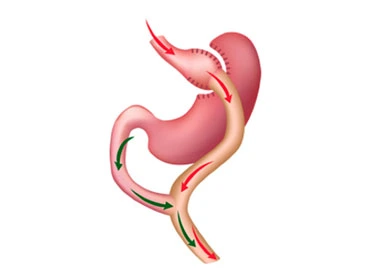
Gastric Bypass (Roux-en-Y)
This procedure reduces stomach size and reroutes part of the small intestine, which leads to both weight loss and hormonal shifts that improve insulin function.

Sleeve Gastrectomy
We remove about 75–80% of the stomach, leaving a smaller “sleeve” that reduces hunger hormones and improves metabolic control.
Each option has its pros and cons, and I always personalize the approach based on your unique health profile and goals.
How the digestive system changes after surgery
What surprises many patients is how hormonal and metabolic changes happen almost immediately—even before significant weight loss begins.
Here’s what changes:
- Your stomach becomes smaller, so you feel full with less food.
- Gut hormones like GLP-1 and PYY increase, helping to control blood sugar and appetite.
- Insulin sensitivity improves dramatically, especially in the liver and pancreas.
- The intestinal rerouting (in bypass surgeries) changes how nutrients are absorbed and how your body responds to food.
These changes explain why so many patients see a rapid improvement in their diabetes, often within days of surgery.
Post-operative care: What you can expect
Recovery is a journey—but you won’t go through it alone. I believe strongly in long-term follow-up and support, especially for patients traveling from abroad. That’s why we design a recovery plan tailored to your needs, with check-ins before and after you return home.
Here’s what to expect:
Hospital stay
Typically 1 day after surgery.
Initial recovery
Most patients are walking the same day and resume light activity within a week.
Diet progression
You’ll move from liquids to purees to solid foods over several weeks, guided by our nutrition team.
Follow-ups
We stay in touch through video calls, messaging, and lab tracking. Many of my patients continue their care with me for months or years—no matter where in the world they live.
The goal isn’t just a successful surgery. It’s a healthier life that lasts—and I’m here to support that every step of the way.
Next steps: How to book a consultation with me for a metabolic surgery
If you’ve made it this far, it probably means you’re seriously considering metabolic surgery as a solution—and I want you to know that you’re in the right place. Taking the first step can feel overwhelming, especially if you’re navigating the process from another country, but I’ve designed it to be simple, supportive, and personalized from the very beginning.
Let me walk you through exactly how we’ll get started.
Step 1: Fill out the contact form — I’ll respond personally
Everything begins with a short form on my website. This isn’t an automated process or a generic intake questionnaire. When you fill it out, I’ll personally review your message and respond to you.
Why? Because I want to start this journey by building trust. Your story, your questions, and your health goals matter—and I believe in listening first.
Once we receive your form, a member of my team will reach out to help you schedule your initial virtual consultation, based on your availability and time zone.
Step 2: Your virtual medical consultation (No travel needed)
Your first consultation with me will take place online, and yes—it will be completely in English, so there’s no need to worry about language barriers. During this video call, I’ll take the time to understand:
- Your motivations for surgery.
- Your medical history and any current conditions.
- Whether you’ve had previous treatments or surgeries.
- Your ability and timeline to travel to Colombia for the procedure.
This is not a rushed or technical meeting. It’s a genuine conversation, and it’s where we begin to design a plan tailored to you.
Step 3: Diagnostic testing and specialist evaluations
Depending on your case, I may recommend some basic diagnostic tests before or after our call. These might include:
- Blood work.
- Abdominal ultrasound.
- Specialist evaluations (like cardiology or endocrinology).
These can often be done in your home country and shared with us digitally. If additional assessments are needed, we’ll guide you every step of the way.
In addition, you’ll meet with members of our multidisciplinary team, including:
- Nutritionist – to assess your current habits and prepare you for post-op changes.
- Psychologist – to ensure emotional readiness for this transformation.
- Other specialists as needed, such as a psychiatrist, pediatrician (for adolescent cases), or functional medicine doctor.
Each evaluation is part of building a safe and holistic surgical plan tailored to your unique needs.
Step 4: Scheduling your metabolic surgery in Colombia
Once all evaluations are complete and we’ve determined you’re a strong candidate, we’ll work with you to schedule your surgery at a time that works for you.
We understand that international travel requires planning—flights, time off work, accommodations—so we’ll remain flexible and communicative throughout the process. We’ll also provide detailed guidance on what to bring, how long you’ll stay, and how to prepare for both the procedure and your return home.
Success stories from my practice: More than just a physical transformation
One of the most rewarding parts of my work is witnessing the incredible journeys my patients go through—not just on the outside, but deep within. In this section, you’ll see before-and-after photos of real people who chose metabolic surgery as a turning point in their lives.
While the physical changes are inspiring, they’re only part of the story.
What truly matters are the medical breakthroughs behind those images: blood sugar levels normalized, medications reduced or eliminated, energy and confidence restored. Many of these patients arrived in Colombia from the U.S., Canada, and across Latin America—looking for expert care, real answers, and a new chance at health. And that’s exactly what they found.
These aren’t just photos. They’re milestones of resilience, healing, and hope.





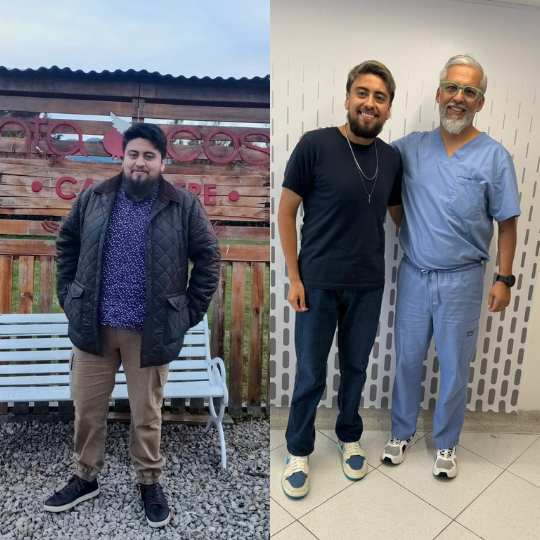
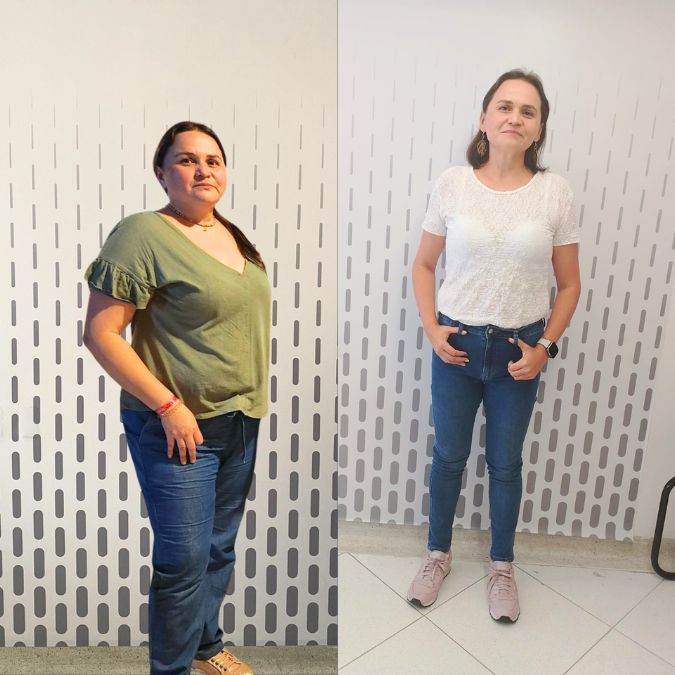



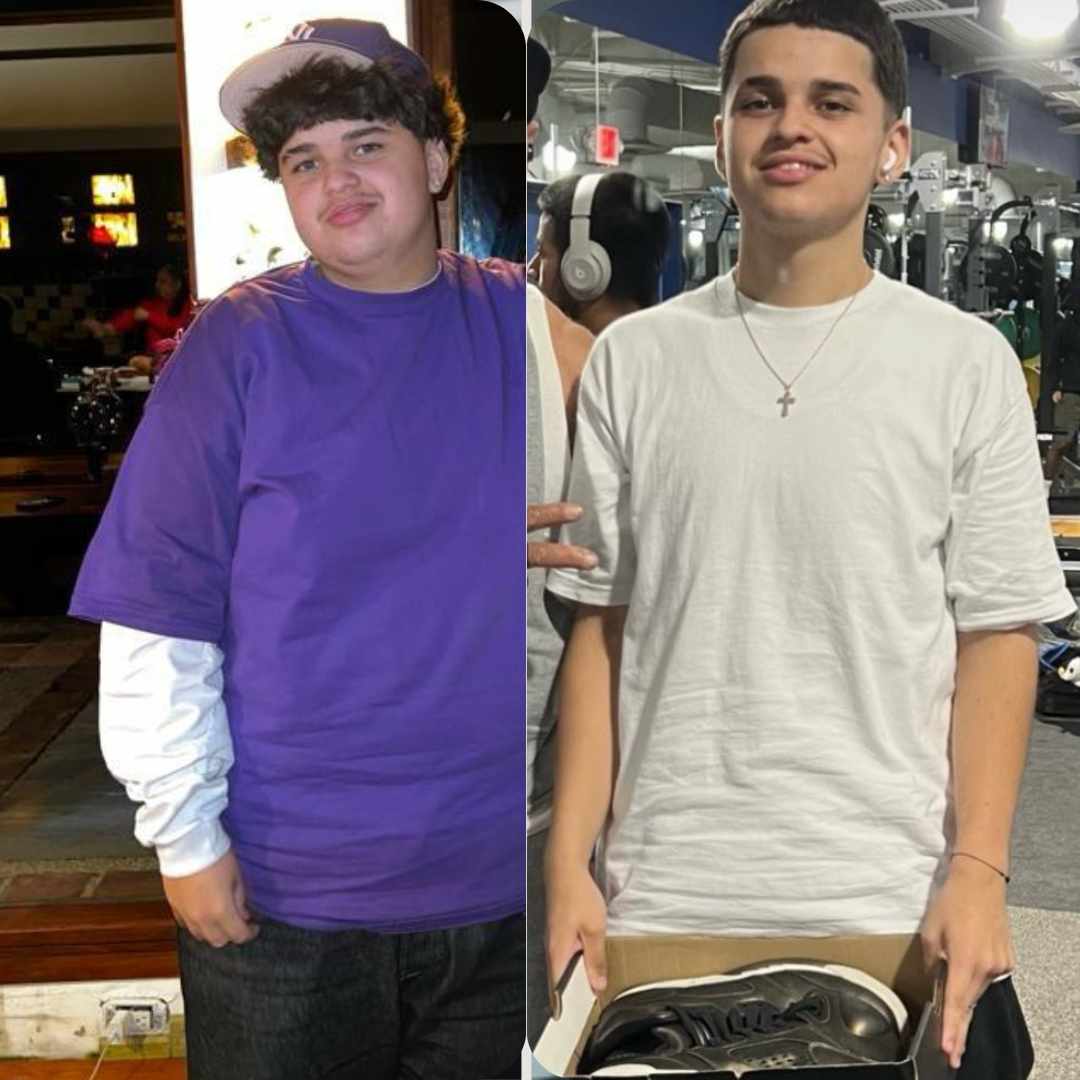
Metabolic surgery in Colombia: World-class care with a personal touch
If you’re reading this and wondering whether it’s truly possible to change your health—and your life—through metabolic surgery in Colombia, I want you to know: the answer is yes. And you don’t have to do it alone.
From the moment you reach out, my team and I are here to make this experience as smooth, safe, and supportive as possible. We understand what it means to travel for medical care, and we’ve designed a system that meets international standards while offering something more—human connection, personalized attention, and ongoing care that doesn’t end when you leave the hospital.
During your stay, you’ll have the option to be hosted at Plazas Suites, a specialized facility designed with bariatric patients in mind. It’s more than just a place to recover—it’s a space where you’ll feel cared for, respected, and comfortable at every stage of your healing journey.
After surgery, you’ll receive at least one year of multidisciplinary follow-up with our expert team at Global Obesity Group, including nutritionists, psychologists, and medical specialists dedicated to your long-term success. And if you’re interested in taking your post-op care even further, ask us about our Sensórica remote monitoring system, which allows us to track your vital signs in real time—no matter where in the world you are.
Meet Dr. Rubén Luna: Your partner in metabolic health
As a surgeon, I’ve spent years refining my technique and building a care model focused on more than just surgery—it’s about transformation, trust, and long-term results. I’ve had the privilege of guiding patients from across the globe through this life-changing journey, and I would be honored to do the same for you.
If you’re ready to take the next step, start by filling out the contact form. I’ll respond personally, and we’ll begin this path together—with expert care, honest guidance, and a plan made just for you.
Frecuently asqued questions about metabolic surgery
Is metabolic surgery reversible?
Most metabolic surgeries, like gastric bypass or sleeve gastrectomy, are not reversible, as they involve permanent anatomical changes. However, their metabolic effects are long-lasting, and the benefits often outweigh the risks.
How soon after metabolic surgery can I return to work or travel?
Many patients return to desk jobs within 2–3 weeks and are safe to travel internationally within 10–14 days, depending on the type of metabolic surgery and personal recovery.
Can metabolic surgery affect fertility or pregnancy?
Yes, positively. Many women experience improved fertility after metabolic surgery due to hormonal balance and weight loss. However, it’s usually recommended to wait 12–18 months before becoming pregnant after surgery.
Will I need to take vitamins or supplements after metabolic surgery?
Yes. After most types of metabolic surgery, long-term vitamin and mineral supplementation is essential to prevent deficiencies—especially vitamin B12, iron, calcium, and vitamin D.
Does metabolic surgery help with conditions like sleep apnea or joint pain?
Absolutely. Many patients experience significant improvement or full resolution of obstructive sleep apnea, joint pain, GERD (acid reflux), and even migraines after surgery.
Can I undergo metabolic surgery if I’ve already had another abdominal surgery?
In many cases, yes. Having a previous surgery doesn’t automatically disqualify you. I carefully assess each case to determine the safest approach and whether additional precautions are needed.
What makes metabolic surgery in Colombia different from other countries?
In Colombia, we combine high-level surgical expertise, modern facilities, and truly personalized care, at a fraction of the cost you’d find in the U.S. or Europe—without compromising safety or quality.
How much weight will I lose after metabolic surgery?
While weight loss varies by individual, most patients lose 60–80% of their excess weight within 12–18 months. However, the primary goal is metabolic improvement, not just weight reduction.
Can metabolic surgery prevent future complications like heart disease or kidney failure?
Yes. By improving blood sugar control, blood pressure, and cholesterol, metabolic surgery significantly reduces long-term risks of cardiovascular disease, kidney damage, and even some cancers.



